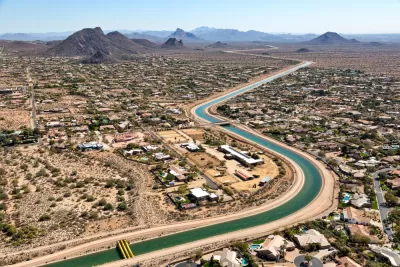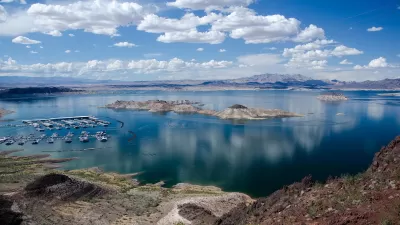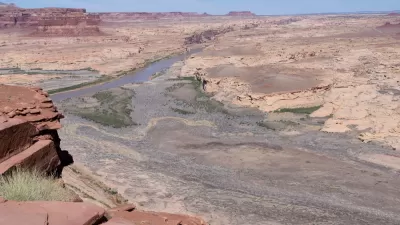Even as more people and companies flock to the state for its climate and economic opportunities, Arizona's water supplies are facing historic shortages.

"Arizona’s annual gross domestic product, nearing $380 billion, has more than doubled since 2000. New solar installations, electric vehicle makers, computer chip manufacturers, data centers, and corporate farming companies are piling into the state." Meanwhile, Phoenix is now the fifth largest city in the country. But as Keith Schneider writes, the state's booming growth is threatened by strained water supplies and dire projections for the future.
Climate change is disrupting the rules of the development game. Drought and extreme heat are emptying rivers and reservoirs, fallowing tens of thousands of acres of farmland, forcing thousands of homeowners to secure water from trucks and not their dead wells, and pushing Arizona ever closer to the precipice of peril.
The Colorado River, which provides over a third of the state's water supply, is 20 percent lower now than two decades ago. And, as we have covered in Planetizen previously, the two largest reservoirs in the country, Lake Mead and Lake Powell, both bordering Arizona, "now hold less water than at any time since soon after they were opened" at 30 percent capacity.
According to the article, the state is starting to take a harder look at ways to reduce its water usage and conserve for the future, but housing construction continues even as Arizona farmers face water shortages, some forced to reduce the amount of crops they grow.
FULL STORY: At Peak of Its Wealth and Influence, Arizona’s Desert Civilization Confronts A Reckoning Over Water

Planetizen Federal Action Tracker
A weekly monitor of how Trump’s orders and actions are impacting planners and planning in America.

Map: Where Senate Republicans Want to Sell Your Public Lands
For public land advocates, the Senate Republicans’ proposal to sell millions of acres of public land in the West is “the biggest fight of their careers.”

Restaurant Patios Were a Pandemic Win — Why Were They so Hard to Keep?
Social distancing requirements and changes in travel patterns prompted cities to pilot new uses for street and sidewalk space. Then it got complicated.

California Homeless Arrests, Citations Spike After Ruling
An investigation reveals that anti-homeless actions increased up to 500% after Grants Pass v. Johnson — even in cities claiming no policy change.

Albuquerque Route 66 Motels Become Affordable Housing
A $4 million city fund is incentivizing developers to breathe new life into derelict midcentury motels.

DC Area County Eliminates Bus Fares
Montgomery County joins a growing trend of making transit free.
Urban Design for Planners 1: Software Tools
This six-course series explores essential urban design concepts using open source software and equips planners with the tools they need to participate fully in the urban design process.
Planning for Universal Design
Learn the tools for implementing Universal Design in planning regulations.
Heyer Gruel & Associates PA
JM Goldson LLC
Custer County Colorado
City of Camden Redevelopment Agency
City of Astoria
Transportation Research & Education Center (TREC) at Portland State University
Camden Redevelopment Agency
City of Claremont
Municipality of Princeton (NJ)





























